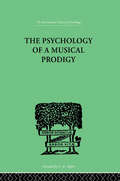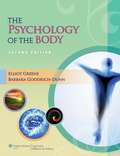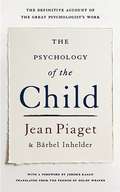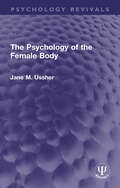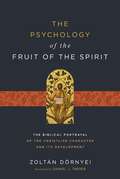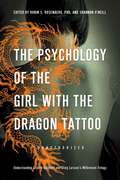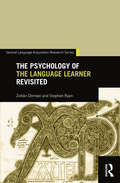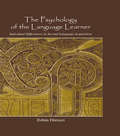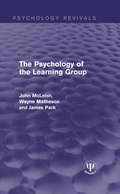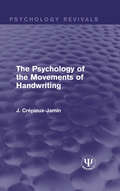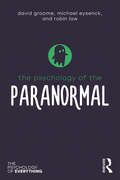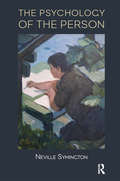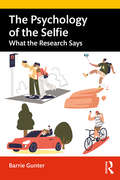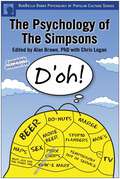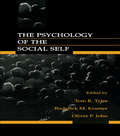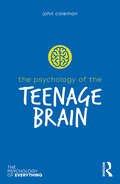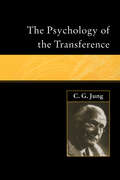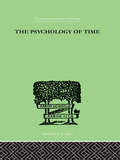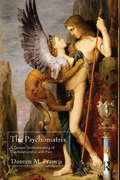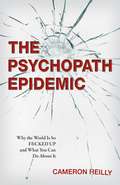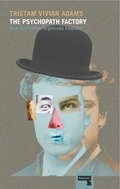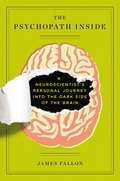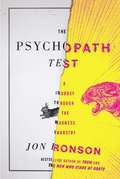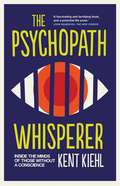- Table View
- List View
The Psychology of a Musical Prodigy (International Library Of Psychology Ser.)
by Revesz, GFirst published in 1999. Routledge is an imprint of Taylor & Francis, an informa company.
The Psychology of the Body (LWW Massage Therapy and Bodywork Educational Series)
by Elliot Greene Barbara Goodrich-DunnThe Psychology of the Body provides massage therapists, bodyworkers, and other professionals who use contact with the body with a greater understanding of the psychological issues that can arise from using touch in their therapy sessions. This new edition continues to provide a crucial basis of knowledge for students, recent grads, and experienced therapists alike regarding the emotional impact of effective therapy. The book describes the connection between the body and the mind, how touch affects this connection, the client's emotional reaction and release, and how to respond to the client in an appropriate manner. With a new, more colorful layout, this new edition has 50% more content and has been fully revised to address the latest science around this topic. For instructors, prepare your students to appropriately identify, understand, and respond appropriately to all aspects of the therapeutic relationship, including the phenomenon of emotional release, dealing with boundaries, effective interpersonal communications, and a body-based approach to ethics. Furthermore, in-text features aim to help students apply their learning to actual practice. Teaching resources like power point presentations, lesson plans, and tests with answer keys are available.
The Psychology of the Child
by Jean Piaget Barbel InhelderPiaget’s influence on psychology has been profound. His pathbreaking investigations and theories of cognitive development have set child psychology moving in entirely new directions. His bold speculations have provided the inspiration for the work of others. His studies have been the subject of many books and countless articles. And, significantly, his influence has spread to other disciplines and is having an ever-growing impact on the general culture at large.Here Jean Piaget, with the assistance of his long-time collaborator Bärbel Inhelder, offers a definitive presentation of the developmental psychology he has elaborated over the last forty years. This comprehensive synthesis traces each stage of the child’s cognitive development, over the entire period of childhood, from infancy to adolescence.
The Psychology of the Female Body (Psychology Revivals)
by Jane M. UssherFirst published in 1989, The Psychology of the Female Body examines the role of the female body in women’s identity and experience. She discusses how key events such as menarche, menstruation, pregnancy, and the menopause affect women’s lives, and looks at the ways in which the female body and reproduction have been used to confine and control women. She puts forward psychological evidence to refute many of the myths surrounding women’s bodies, highlighting how empirical evidence shows that, contrary to what stereotypes suggest, women are not victims of their biology. This book will be of interest to students of psychology, sociology, gender studies and women’s studies.
The Psychology of the Fruit of the Spirit: The Biblical Portrayal of the Christlike Character and Its Development
by Zoltán DörnyeiFor centuries, the fruit of the Spirit has rightfully served as a wellspring of reflection on the virtues that epitomize the Christian life and character-building. However, the notion of the fruit of the Spirit is not limited solely to forming the biblical foundation of ethical living.Psychologist and theologian Zoltán Dörnyei argues that if we understand the nine attributes collectively as a concise portrayal of the ideal Christian self, this approach places the notion of the fruit of the Spirit at the intersection of several important theological themes, such as being conformed to the divine image, the gradual advancement of the kingdom of God, and new creation. In The Psychology of the Fruit of the Spirit, Dörnyei offers a scholarly exposition of the relevant theological content associated with the fruit of the Spirit. Complementing his theological reflections with findings from the field of psychology, he brings expertise in both psychology and theology to bear on this important biblical concept. His integrated perspective helps to uncover the full meaning and theological potential of the fruit of the Spirit by helping to clarify the nature of its nine facets, defining broader psychological dimensions that underlie the fruit, and offering practical lessons for cultivating it in the Christian life.
The Psychology of the Girl with the Dragon Tattoo: Understanding Lisbeth Salander and Stieg Larsson's Millennium Trilogy
by Lynne McDonald-SmithLisbeth Salander, heroine of Stieg Larsson's The Girl with the Dragon Tattoo and its sequels, is one of the most compelling, complex characters of our time. Is she an avenging angel? A dangerous outlaw? What makes Salander tick, and why is our response to her—and to Larsson's Millennium trilogy—so strong? In The Psychology of the Girl with the Dragon Tattoo, 19 psychologists and psychiatrists attempt to do what even expert investigator Mikael Blomkvist could not: understand Lisbeth Salander. What does Lisbeth's infamous dragon tattoo really say about her? Why is Lisbeth so drawn to Mikael, and what would they both need to do to make a relationship work? How do we explain men like Martin Vanger, Nils Bjurman, and Alexander Zalachenko? Is Lisbeth just as sexist and as psychopathic as they are? What is it about Lisbeth that allows her to survive, even thrive, under extraordinary conditions? How is Lisbeth like a Goth-punk Rorschach test? And what do we learn about ourselves from what we see in her?
The Psychology of the Human-Animal Bond
by Güler Boyra Christopher Blazina David Shen-MillerThere have been dramatic increases in the financial, emotional, and psychological investment in pets over the past four decades. The increasing importance of animal companions in people's lives has resulted in growing emphasis on the human-animal bond within academic literature. This book introduces practicing and emerging professionals to vital subject matter concerning this growing specialty area by providing an essential framework and information through which to consider the unique contextual backdrop of the human-animal bond. Such contexts include a wide array of themes including: issues of attachment and loss, success and frustration with making and sustaining connections, world views regarding animal ethics, familial history of neglect or abuse, and cultural dynamics that speak to the order of things between mankind and nature. Adopting a contextual stance will aid mental health professionals in appreciating why and how this connection has become a significant part of everyday life for many. As with any other important clinical dynamic, training and preparation are needed to gain competence for professional practice and research. To this end, an ensemble of international experts across the fields of psychology and mental health explore topics that will help both new and established clinicians increase and understanding of the various ways the human-animal bond manifests itself. Perspectives from beyond the scope of psychology and mental health such as anthropology, philosophy, literature, religion, and history are included to provide a sampling of the significant contexts in which the human-animal bond is established. What brings these divergent topics together in a meaningful way is their relevance and centrality to the contextual bonds that underlie the human-animal connection. This text will be a valuable resource that provides opportunities to deepen one's expertise in understanding the psychology of the human-animal bond.
The Psychology of the Language Learner Revisited (Second Language Acquisition Research Series)
by Zoltan Dornyei Stephen RyanOver the past decade, the focus of inquiry into the psychology of SLA has shifted from the analysis of various characteristics within individuals towards a greater consideration of individuals’ dynamic interactions with diverse contexts. This revisit of the bestselling The Psychology of the Language Learner reflects on these developments by challenging some of the assumptions upon which the original text was based, maintaining the familiar structure of the original, while situating the discussion within a very different theoretical framework. Written in a lively, accessible style, the book considers how the field has evolved and maintains a keen eye on the future, suggesting exciting new directions for the psychology of SLA. The Psychology of the Language Learner Revisited will appeal to students and researchers in a wide range of disciplines, including applied linguistics, second language acquisition, modern languages, and psychology.
The Psychology of the Language Learner: Individual Differences in Second Language Acquisition (Second Language Acquisition Research Series)
by Zoltán DörnyeiResearch results over the past decades have consistently demonstrated that a key reason why many second language learners fail--while some learners do better with less effort--lies in various learner attributes such as personality traits, motivation, or language aptitude. In psychology, these attributes have traditionally been called "individual differences." The scope of individual learner differences is broad--ranging from creativity to learner styles and anxiety--yet there is no current, comprehensive, and unified volume that provides an overview of the considerable amount of research conducted on various language learner differences, until now.Each chapter in this new volume focuses on a different individual difference variable. Besides a review of the relevant second language literature, Zoltán Dörnyei presents a concise overview of the psychological research involving each topic. A key concern for the author has been to define the various learner factors as measurable constructs and therefore the discussion includes a summary of the most famous tests and questionnaires in each domain.A wide range of readers will benefit from this book--students in linguistics, applied linguistics, modern languages, and psychology programs; second language teachers participating in in-service training courses; and researchers in second language acquisition and psychology.
The Psychology of the Learning Group (Psychology Revivals)
by James Park John McLeish Wayne MathesonOriginally published in 1973, this work takes a hard look at the claims made for the small group as a learning medium (lecture, structured discussion, ‘sensitivity’, training groups etc.). Various theories of group dynamics, leadership function and learning process are looked at critically on the basis of actual research findings. It was intended for students of social psychology and anyone teaching or training to teach at Further Education level at the time, and will still be of interest in its historical context today.
The Psychology of the Movements of Handwriting (Psychology Revivals)
by J. Crepieux-JaminOriginally published in 1926, this title is a summary in English of the works of the great French graphologist Jules Crépieux-Jamin. He was recognised at the time in France as the first authority on the subject of graphology, but was less well-known in England and America. This title brought his work to the English speaking world and he went on to be known as one of the most important exponents of graphology.
The Psychology of the Paranormal (The Psychology of Everything)
by David Groome Michael Eysenck Robin LawCan mediums communicate with the dead? Do people really believe they’ve been abducted by aliens? Why do some people make life decisions based on their horoscope? The Psychology of the Paranormal explores some commonly held beliefs regarding experiences so strange they can defy an obvious scientific explanation. The book explains how psychologists have conducted experiments to provide insight into phenomena such as clairvoyance, astrology, and alien abduction, as well as teaching us fundamental truths about human belief systems. From debunking myths about Extra Sensory Perception, to considering whether our lives can truly be fated by the stars, The Psychology of the Paranormal shows us that however unlikely, belief in the paranormal will continue to be widespread.
The Psychology of the Person
by Neville SymingtonThis new title, from a distinguished psychoanalyst, will inspire both those in the psychoanalytic field, and the general reader.'In this book the author attempts to sketch out a "Psychology of the Person". The definition of "person" implies that no two people, even identical twins, are the same. Although this is obvious and no sensible person would quarrel with such a view, yet many terms are used that imply that there is a sameness between two or more people. For instance, it is often said that one individual is identified with another which, in ordinary language, means that he or she makes him or herself the same as the other, yet this is an impossibility. So, what is a person? How is a person different from someone who is not a person? This book sets out to answer these questions.
The Psychology of the Selfie: What the Research Says
by Barrie GunterThe Psychology of the Selfie provides a comprehensive overview and analysis of research on the significance of selfies, offering insights into the topic from a psychological perspective and examining important issues such as body image, self-objectification, mental health and psychological benefits. Selfies are a worldwide phenomenon. Although dismissed by critics as a sign of self-absorbed narcissism, they are also a social currency that maintains and reinforces friendships, a feedback loop for self-identity affirmation, a promotional tool for gaining social influence, and a method for preserving memories of life events. In this book, Barrie Gunter expertly explores the psychological underpinnings of the contemporary global phenomenon of "selfies", from the historical roots and meteoric rise due to technical advancements, to the different personality types of selfie-takers, to social relationships, to group and personal identity. Looking at both the psychological nature and impact of selfies, this book reviews different psychological outcomes for selfie-takers, both positive and negative, and the growth in psychological and physical problems that can sometimes arise. Presenting a comprehensive analysis specifically of selfie behaviour, this book is an essential reference for students and researchers in communications and media, journalism, information studies, psychology and sociology, as well as anyone with a general interest in the phenomenon.
The Psychology of the Simpsons: D'oh!
by Alan S. Brown Chris LoganPsychologists turn their attention to The Simpsons, one of America's most popular and beloved shows, in these essays that explore the function and dysfunctions of the show's characters. Designed to appeal to both fans of the show and students of psychology, this unique blend of science and pop culture consists of essays by professional psychologists drawn from schools and clinical practices across the country. Each essay is designed to be accessible, thoughtful, and entertaining, while providing the reader with insights into both The Simpsons and the latest in psychological thought. Every major area of psychology is covered, from clinical psychology and cognition to abnormal and evolutionary psychology, while fresh views on eclectic show topics such as gambling addiction, Pavlovian conditioning, family therapy, and lobotomies are explored.
The Psychology of the Social Self (Applied Social Research Series)
by Oliver P. John Tom R. Tyler Roderick M. KramerLeading theoreticians and researchers present current thinking about the role played by group memberships in people's sense of who they are and what they are worth. The chapters build on the assumption, developed out of social identity theory, that people create a social self that both defines them and shapes their attitudes and behaviors. The authors address new developments in the theoretical frameworks through which we understand the social self, recent research on the nature of the social self, and recent findings about the influence of social context upon the development and maintenance of the social self.
The Psychology of the Teenage Brain (The Psychology of Everything)
by John ColemanWhy do teenagers stay up late and struggle to get up in the morning? Do teenagers really take more risks? What is happening with teenagers’ hormones? The Psychology of the Teenage Brain offers all those involved in teenagers’ lives insight into what’s happening in their brains and how understanding them can improve relationships and communication at this crucial stage. It explains key topics, including the way the brain changes during adolescence, the role of hormones, and what we really know about risk and resilience, sleep and peer pressure. It challenges the stereotype of the ''snowflake generation'' and explores young people’s mental health. Written for all parents and caregivers, this book will help with the challenges of having a teenager in the home. It also offers crucial understanding for all students and practising professionals in the fields of social work, counselling, health and education who work with teenagers.
The Psychology of the Transference
by C.G. JungAn account of Jung's handling of the transference between psychologist and patient in the light of his conception of the archetypes. Based on the symbolic illustrations in a sixteenth century alchemical text.
The Psychology of time (International Library Of Psychology Ser.)
by Sturt, MaryFirst Published in 1999. Routledge is an imprint of Taylor & Francis, an informa company.
The Psychomatrix: A Deeper Understanding of Our Relationship with Pain
by Doreen M. FrancisWhat is pain? What does it mean to have a relationship with it and how does this affect your identity and existence? The author's definition of pain is derived from that proposed by scientists, such as Melzack, Wall and Freud. Pain is a dynamic, multi-layered, diverse collection of experiences, which impacts and influences us throughout life. Pain is a kind of conglomerate of past, traumatic, neurobiological, psychological and emotional imprints--pain as in suffering or being in pain. The author argues that it is not pain, as such, but our relationship with pain, which is most significant to the processes of our lives. In examining the combination of Freud's psychosexual theory of development and Melzack's theory of the neuromatrix, the author endeavours to evidence her theory that there is the distinct possibility for the existence of what she has named a Psychomatrix-patterns of pain (loss, abandonment, grief, rejection, desire) imprinted from infancy.
The Psychopath Epidemic: Why the World Is So F*cked Up and What You Can Do About It
by Cameron ReillySimilar to the bestselling Sociopath Next Door comes a unique look at the psychopaths among us and how our society--from businesses and governments to religions--encourages and rewards psychopathic behavior, and what average citizens can do to survive and thrive when we must live with, learn from, or be led by sociopaths.Psychiatrists estimate that 1 percent of the adult population are psychopaths. That's about two million Americans. And they are our bosses, our politicians, our priests, and our neighbors. And they are running our economy and our lives. Every day in the news we hear about people in positions of power doing deplorable things--in business, politics, and government, from sexual harassment to polluting the environment to covering up crimes. And it's no wonder considering a small percentage of people wield a large amount of power, and that these very same people fit the definition of a "psychopath." A highly engaging and gripping read, Cameron Reilly's book adds to our growing understanding of sociopaths with a detailed analysis of how our society encourages and rewards psychopathic tendencies, and how, because of this, psychopaths the world over have risen to power. Using historical references to pop culture examples, Reilly offers a field guide to psychopaths--how to spot them and how to outmaneuver them so you can keep your sanity intact. This is the first-of-its-kind book to examine the shocking evidence and then suggest practical solutions for saving us all.
The Psychopath Factory: How Capitalism Organizes Empathy
by Tristam AdamsThe Psychopath Factory: How Capitalism Organizes Empathy examines how the requirements, stimuli, affects and environments of work condition our empathy. In some cases, work calls for no empathy - characters who don't blink or flinch in the face of danger nor crack under pressure. In other cases, capitalism requires empathy in spades -charming, friendly, sensitive and listening managers, customer service agents and careers. When workers are required to either ignore their empathy to-do a job, or dial it up to increase productivity, they are entering a psychopathic modality. The affective blitz of work, flickering screens, emotive content, vibrating alerts and sounding alarms erode our sensitivities whilst we are modulated with attention stimulants, social lubricants and so called anti-anxiety drugs. This is amidst a virulent and exacerbating climate of competition and frenzied quantification. Capitalism pressures us to feign empathy and leverage social relationships on one hand, whilst being cold and pragmatic on the other. We are passionate and enthusiastic whilst keeping a professional distance. Sympathy, care, compassion and altruism are important; The Psychopath Factory: How Capitalism Organizes Empathy argues that itis a mistake to presuppose that empathy can achieve these. Rather than being subject to the late capitalist organization of our empathy, psychopathy could be a means of escape.
The Psychopath Inside: A Neuroscientist's Personal Journey into the Dark Side of the Brain
by James FallonThe memoir of a neuroscientist whose research led him to a bizarre personal discovery James Fallon had spent an entire career studying how our brains affect our behavior when his research suddenly turned personal. While studying brain scans of several family members, he discovered that one perfectly matched a pattern he’d found in the brains of serial killers. This meant one of two things: Either his family’s scans had been mixed up with those of felons or someone in his family was a psychopath. Even more disturbing: The scan in question was his own. This is Fallon’s account of coming to grips with this discovery and its implications. How could he, a happy family man who had never been prone to violence, be a psychopath? How much did his biology influence his behavior? Fallon shares his journey to answer these questions and the discoveries that ultimately led to his conclusion: Despite everything science can teach, humans are even more complex than we can imagine. .
The Psychopath Test: A Journey Through the Madness Industry
by Jon RonsonIn this madcap journey, a bestselling journalist investigates psychopaths and the industry of doctors, scientists, and everyone else who studies them. The Psychopath Test is a fascinating journey through the minds of madness. Jon Ronson's exploration of a potential hoax being played on the world's top neurologists takes him, unexpectedly, into the heart of the madness industry. An influential psychologist who is convinced that many important CEOs and politicians are, in fact, psychopaths teaches Ronson how to spot these high-flying individuals by looking out for little telltale verbal and nonverbal clues. And so Ronson, armed with his new psychopath-spotting abilities, enters the corridors of power. He spends time with a death-squad leader institutionalized for mortgage fraud in Coxsackie, New York; a legendary CEO whose psychopathy has been speculated about in the press; and a patient in an asylum for the criminally insane who insists he's sane and certainly not a psychopath. Ronson not only solves the mystery of the hoax but also discovers, disturbingly, that sometimes the personalities at the helm of the madness industry are, with their drives and obsessions, as mad in their own way as those they study. And that relatively ordinary people are, more and more, defined by their maddest edges.
The Psychopath Whisperer: Inside the Minds of Those Without a Conscience
by Kent KiehlA chilling and provocative scientific dissection of the psychopath's brain Fact: A psychopath is 6 times more likely to commit a new crime after release from prison. Fact: Some forms of group therapy make psychopaths more likely to commit a new crime compared to no treatment at all. Fact: A psychopath is born every 47 seconds. Kent Kiehl is the 'Psychopath Whisperer', a neuroscientist who has dedicated his career to understanding what makes a mind turn criminal. Are psychopaths 'evil' and untreatable, or do they suffer from a mental illness comparable to schizophrenia or epilespsy? Do they - do we - have free will? Based on breathtaking research, including personality surveys and brain imaging scans of thousands of criminals, Kiehl pinpoints the biological machinery of psychopathy - and offers a radical new perspective on identifying & treating the psychopaths in our midst.
